Unit 1 Cultural relics Grammar (共49张PPT)
文档属性
| 名称 | Unit 1 Cultural relics Grammar (共49张PPT) |
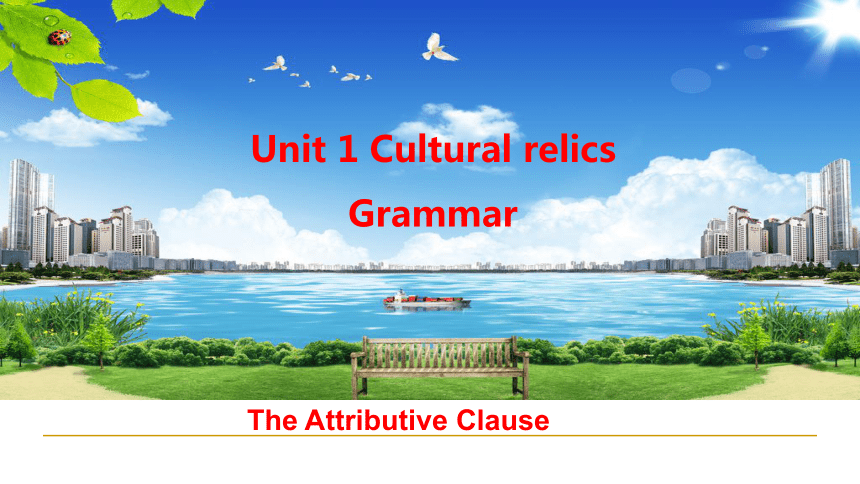
|
|
| 格式 | zip | ||
| 文件大小 | 480.4KB | ||
| 资源类型 | 教案 | ||
| 版本资源 | 人教版(新课程标准) | ||
| 科目 | 英语 | ||
| 更新时间 | 2017-11-20 00:00:00 | ||
图片预览

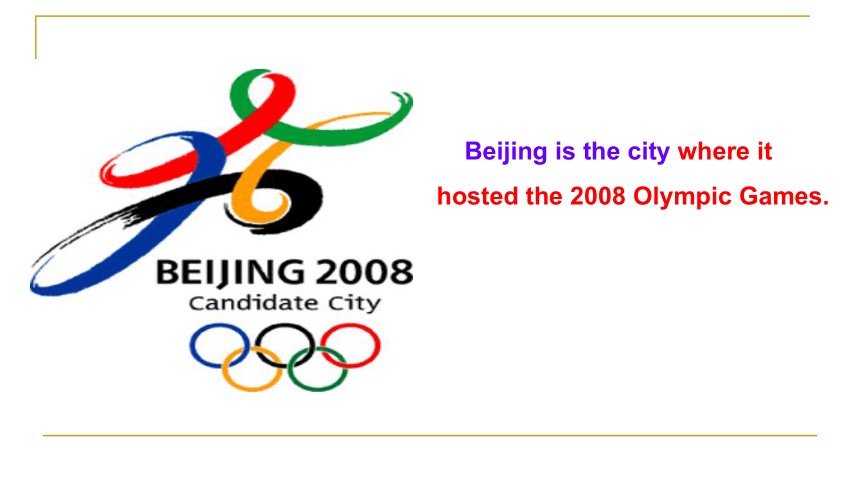
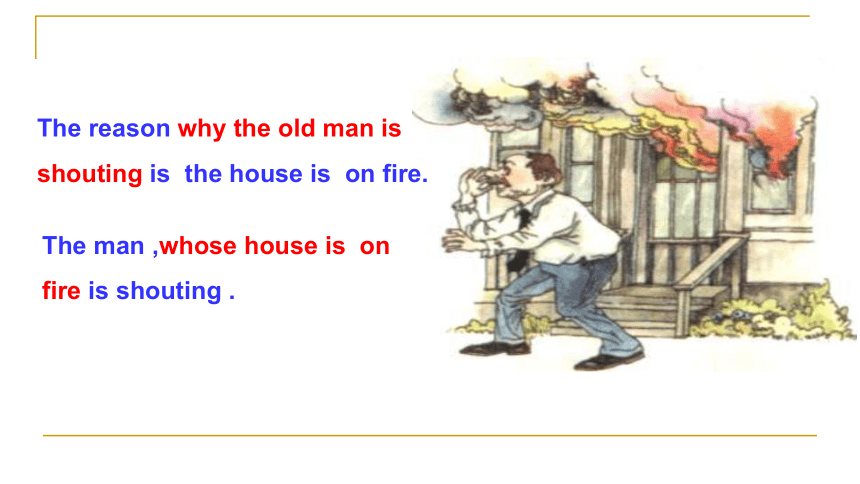
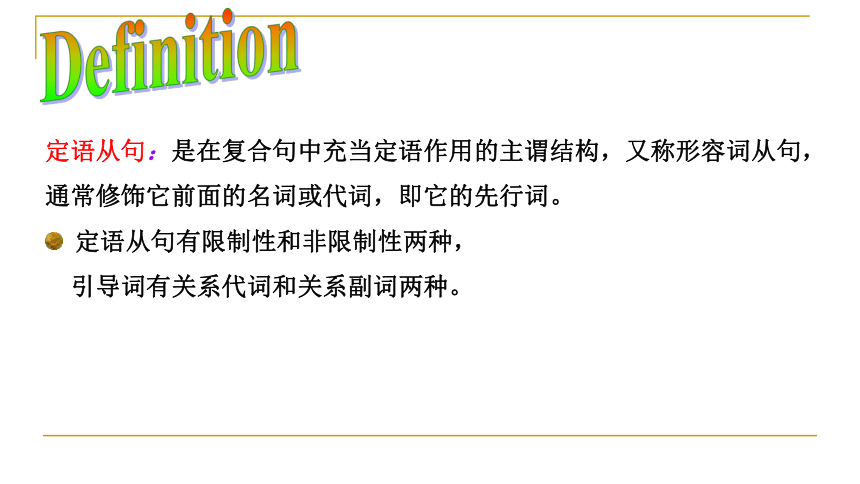
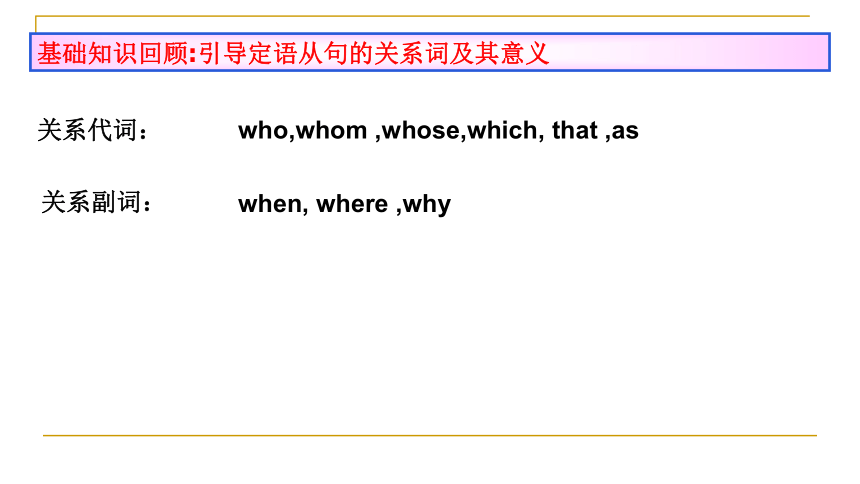
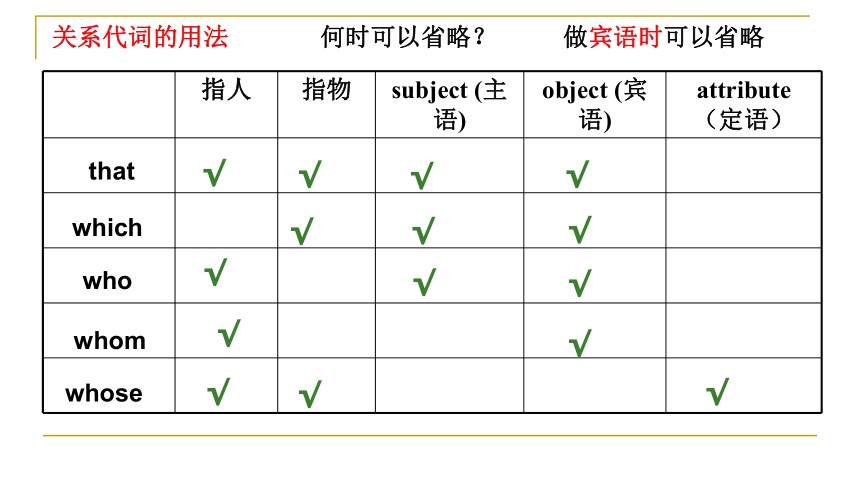
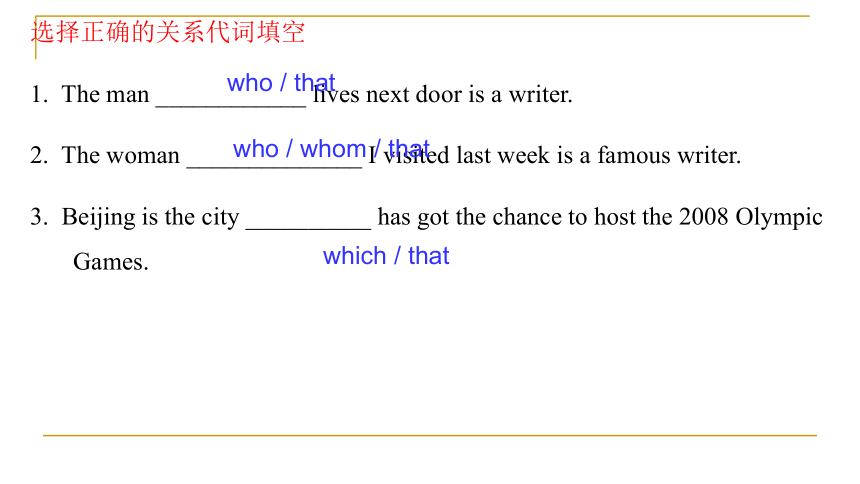
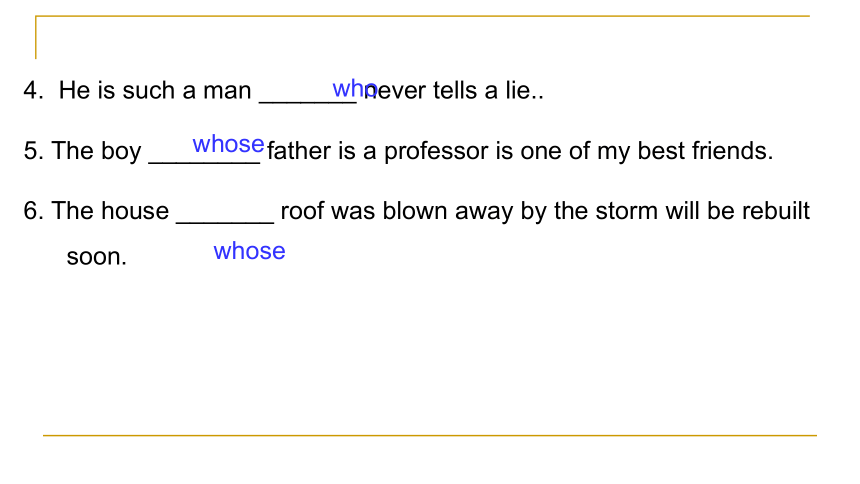
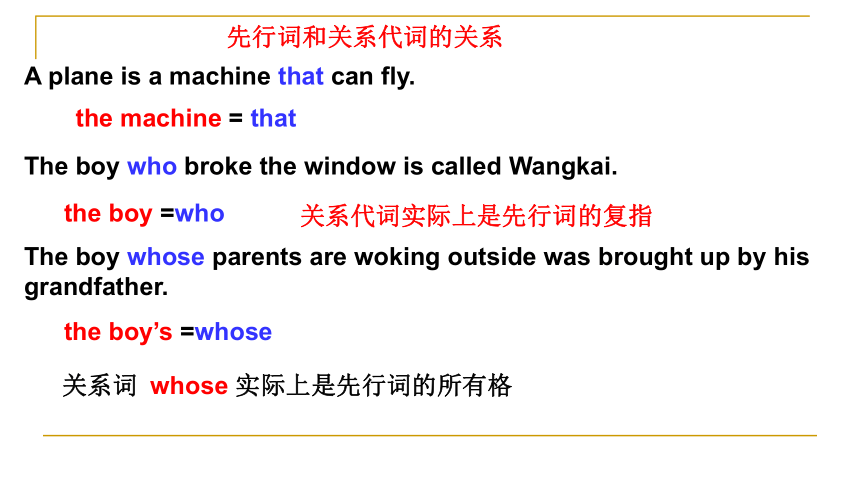
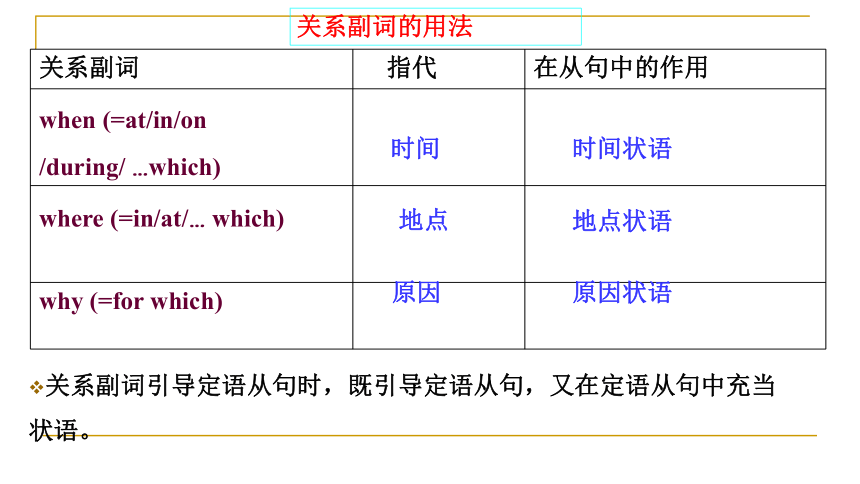


文档简介
课件49张PPT。
Unit 1 Cultural relics
Grammar The Attributive Clause Beijing is the city where it hosted the 2008 Olympic Games.The reason why the old man is shouting is the house is on fire.The man ,whose house is on fire is shouting .Definition定语从句:是在复合句中充当定语作用的主谓结构,又称形容词从句,通常修饰它前面的名词或代词,即它的先行词。
定语从句有限制性和非限制性两种,
引导词有关系代词和关系副词两种。基础知识回顾:引导定语从句的关系词及其意义关系代词: 关系副词: who,whom ,whose,which, that ,aswhen, where ,why关系代词的用法whomwhowhichthatwhose√√√√√√√√√√√√√√√何时可以省略?做宾语时可以省略选择正确的关系代词填空
1. The man ____________ lives next door is a writer.
2. The woman ______________ I visited last week is a famous writer.
3. Beijing is the city __________ has got the chance to host the 2008 Olympic Games.
who / thatwho / whom / thatwhich / that 4. He is such a man _______ never tells a lie..
5. The boy ________ father is a professor is one of my best friends.
6. The house _______ roof was blown away by the storm will be rebuilt soon.
whowhosewhose先行词和关系代词的关系A plane is a machine that can fly.
The boy who broke the window is called Wangkai.
The boy whose parents are woking outside was brought up by his grandfather.
the machine = thatthe boy =whothe boy’s =whose关系代词实际上是先行词的复指关系词 whose 实际上是先行词的所有格关系副词的用法时间时间状语地点地点状语原因原因状语关系副词引导定语从句时,既引导定语从句,又在定语从句中充当状语。3、注意事项:
1、关系代词和关系副词在定从中的不同成分
a、This is the place where he works.(状语)
This is the place which(that) we visited last year.(宾语)b、That was the time when he arrived.(状语)
Do you still remember the days that (which) we spent together?(宾语)
c、This is the reason why he went.(状语)
The reason that (which) he gave us was quite reasonable.(宾语)
2. 关系副词都等于一个适当的介词+which,在从句中作状语
When=in/at/on/during…+which;
Where=in/at/on/…+which;
Why=for /…+which 1.Do you still remember the day when (on which) we went to visit the museum together?
2.This is the factory where (in which) my father once worked.
3.This is the reason why (for which) he was late.3、关系代词放在介词后面,只能用which或whom
a.This is the boy with whom he worked.
b.This is the boy whom he worked with.
c. This is the boy who/that he worked with.
d. This is the boy he worked with.e. The house where we live is not large.
f. The house in which we live is not large.
g. The house which/that we live in is not large.
h. The house we live in is not large.
关系代词前介词的确定1.根据从句中动词与先行词的逻辑关系,请体会:
e.g. Is that the newspaper for which you often write articles?
2. 根据从句中动词或形容词的习惯搭配,如:
e.g. Can you explain to me how to use these idioms about which I’m sure.
3. 根据先行词与介词的搭配习惯,请体会:
e.g. 1949 was the year in which the P.R.C. was founded.关系代词前介词的确定4.非限制性定与从句中,要表示先行词的一部分时,可用“数词/代词 + of + 关系代词”的结构,如:
e.g. There are 50 students in our class, two-thirds of whom have been to Beijing.
关系代词前的介词的确定5. Whose从句可转换为“ of +关系代词”型,如:
e.g. They live in a house, whose door opens to the south.
They lived in a house, of which the door opens to the south.
They lived in a house, the door of which opens to the south.
1.? Do you like the book she spent $10?
2.? Do you like the book she paid $10?
3.? Do you like the book she often talks?
on whichfor whichabout which介词+关系代词的练习4. There is a tall tree outside, stands our teacher.
5.? China has a lot of rivers, the second longest ________
is the Yellow River.
6. The tower ___________ people can have a good view is on the hill.
under whichof whichfrom which 二、定语从句的种类定语从句The Restrictive Attributive Clause
限制性定语从句
The Non-Restrictive Attributive Clause
非限制性定语从句非限制性定语从句的练习
1.He has smoothly entered a key middle school,_______ makes his parents very happy.
2.Mr King, ______ legs were badly hurt, was quickly taken to hospital.
3.He said he had no bike, ________ was not true.
whichwhosewhich4.We shall make a decision about Ms King, ______ story I have just told you.
5.Mr Smith,_______ gave a talk several months ago, will come again.
6.My uncle has come back from abroad,________ I haven’t met for along time.
whosewhowhom 三、限制性定语从句和非限制性定语从句的区别 1.限制性定语从句是先行词在意义上不可缺少的定语,如果去掉,主句的意思就不完整或失去意义。这种从句和主句的关系十分密切,写时不用逗号分开。限制性定语从句中作宾语的关系代词常可省略。如:
a) What is the name of the tall woman who is standing there?
站在那边的那个女人叫什么名字?
b) Toronto is a city (that) I' ve always wanted to visit.
多伦多是我常想去参观的一个城市。
2.非限制性定语从句和主句关系不十分密切,只是对先行词作些附加的说明, 如果去掉, 主句的意思仍然清楚。这种从句和主句之间往往用逗号分开,一般不用that引导。非限制性定语从句中,关系词不可省略。如:a) Rome, which is the capital of Italy, has a very long history.
意大利的首都罗马历史非常悠久。
b) Yesterday I met Professor King, who came from the University of London.
昨天我遇见金教授,他从伦敦大学来的。
3.关系代词whom在限制性定语从句中作宾语时可用who代替whom,但在非限制性定语从句中作宾语时不可用who来代替。
eg. This is the girl whom /who I met in the street.
这是我在街上遇到的女孩。eg. A young man had a new girl friend, whom he wanted to impress.
一个年轻的小伙子新交了一个女朋友,他想给她留下深刻印象。
修饰先行词修饰先行词或整个句子无逗号与主句不分开有逗号与主句分开使用时可以用that和why 引导使用时不能用that和why引导与主句语意关系紧凑,定语从句不能删除与主句语意关系松散,定语从句可以删除
Comparing(昨天来过这里的那个男人又来了。)(这个男人昨天来过这里,他又来了。)b) The man ,who came here yesterday, has come again.
a) The man who came here yesterday has come again.
Group One试比较Group two
a) He will wear no clothes which will make him different from others.
他不会穿一些使他显得与众不同的衣服。
b) He will wear no clothes, which will make him different from others.
他不穿衣服,这会使他显得与众不同。
四、as引导定语从句,多与 as , so ,such 和the same连用,在从句中作主语或宾语。 1.Such people as you describe are rare nowadays.
2.Let’s discuss only such questions as concern every one of us.
3.Would you please buy me the same novel as you bought for brother yesterday, Mum?
4. As we all know, John is an honest man.
比较:
She wore the same dress that she wore at Mary’s wedding.
关系代词as和which(在从句中作主语、宾语和表语)
as和which所代表的都是整个句子所表示的内容时。有两点不同之处:
as 与 which 的区别www.ks5u.com 高考资源网1.在位置上,as引导的非限制定语从句可位于主句后面,前面和中间;而which引导的非限制定语从句只能位于主句之后。
As we all know, Taiwan belongs to /china.
Taiwan, as we all know, belongs to China.
Taiwan belongs to China, as we all know.
2.在意义上,as 常译为“正如...”,“就像...”, which常译为“这一点”(并不绝对)
常用在习语as anybody can see, as is known to all, as we had expected, as often happens, as I remember, as is often the case.(as常用于be known / expected / announced / reported / shown等结构中)
He is often late, as is known to all.
Our team, as we had expected, defeated theirs in the football.
As we all know, he studies very hard.
3.在搭配上,在与 as 代表前面的整个主句并在从句中作主语时,从句中的谓语必须是系动词或行为动词的被动式,而which则用行为动词的主动式。 例如:
It rained hard yesterday, ____ prevented me from going to the park.
A. that B. which C. as D. it
Choose the right answer.1. As many children____ came were given some cakes.
A. that B. as C. who D. whom
2. The visitors saw rows of houses the roofs____ are red.
A. on which B. of which C. where D. that
3. I usually take a nap after lunch, ____ is my habit.
A. which B. as it C. as D. that√√√4. Please tell me the way ____ you did the job.
A. how B. where C. which D. in which
5. Is this museum_____ some German friends visited the day before yesterday?
A. the one B. which C. that D. where
6. The farmer uses wood to build a house_____ to store grain.
A. in which B. where C. that D. with which
√√√7. I shall never forget the years_____ I spent in the country with the farmers, _____ has a great effect on my life.
A. when; which B. that; which
C. when; that D. which; that
8. Little has been done_____ is helpful to our work.
A. that B. what C. which D. all that
√√9. Perhaps this is the only market____ you can get such cheap goods.
A. that B. of which C. by which D. where
10. We’ll put off the outing until next week, ____ we won’t be so busy.
A. when B. which C. at which D. in that √√1. The thought of going back home was _____ kept him happy while he was working abroad.
A. that B. all that C. all which D. which
2. The Beatles, _____many of you are old enough to remember , came from Liverpool.
A. what B. that C. how D. as高考典例:√√3. We’re just trying to reach a point ____ both sides will sit down together and talk.
A. where B. that C. when D. which
4. The owner of the cinema needed to make a lot of improvements and employ more people to keep it running, ____ meant spending tens of thousands of pounds.
A. who B. that C. as D. which√√5. Look out ! Don’t get too close to the house ____ roof is under repair.
A. Whose B. which C. of which D. that
6. I was give three books on cooking, the first ____ I really enjoyed.
A. of that B. of which C. that D. which
√√7. Women____ drink more than two cups of coffee a day have a greater chance of having heart disease than those ___ don’t.
A. who; / B. /; who C. who; who D. /;/
8. Do you have anything to say for yourselves?
--Yes, there is one point ___ we must insist on.
A. why B. where C. how D. /√√1. After class, read the passage on Page 64 . Complete the sentences below, using who, whom, which, that or whose.
2. Please translate the following sentences into English, using
the Attributive Clauses.
1)她的父母不允许她嫁给任何家境贫寒的人。
2)两位朋友谈论了许多他们所记得的大学里的人和事。
3)正在那儿唱歌的女孩是我的妹妹。
4)这就是你上个月参观的博物馆吗?
5)他正在写字用的那支钢笔是我的。 Homework
Grammar The Attributive Clause Beijing is the city where it hosted the 2008 Olympic Games.The reason why the old man is shouting is the house is on fire.The man ,whose house is on fire is shouting .Definition定语从句:是在复合句中充当定语作用的主谓结构,又称形容词从句,通常修饰它前面的名词或代词,即它的先行词。
定语从句有限制性和非限制性两种,
引导词有关系代词和关系副词两种。基础知识回顾:引导定语从句的关系词及其意义关系代词: 关系副词: who,whom ,whose,which, that ,aswhen, where ,why关系代词的用法whomwhowhichthatwhose√√√√√√√√√√√√√√√何时可以省略?做宾语时可以省略选择正确的关系代词填空
1. The man ____________ lives next door is a writer.
2. The woman ______________ I visited last week is a famous writer.
3. Beijing is the city __________ has got the chance to host the 2008 Olympic Games.
who / thatwho / whom / thatwhich / that 4. He is such a man _______ never tells a lie..
5. The boy ________ father is a professor is one of my best friends.
6. The house _______ roof was blown away by the storm will be rebuilt soon.
whowhosewhose先行词和关系代词的关系A plane is a machine that can fly.
The boy who broke the window is called Wangkai.
The boy whose parents are woking outside was brought up by his grandfather.
the machine = thatthe boy =whothe boy’s =whose关系代词实际上是先行词的复指关系词 whose 实际上是先行词的所有格关系副词的用法时间时间状语地点地点状语原因原因状语关系副词引导定语从句时,既引导定语从句,又在定语从句中充当状语。3、注意事项:
1、关系代词和关系副词在定从中的不同成分
a、This is the place where he works.(状语)
This is the place which(that) we visited last year.(宾语)b、That was the time when he arrived.(状语)
Do you still remember the days that (which) we spent together?(宾语)
c、This is the reason why he went.(状语)
The reason that (which) he gave us was quite reasonable.(宾语)
2. 关系副词都等于一个适当的介词+which,在从句中作状语
When=in/at/on/during…+which;
Where=in/at/on/…+which;
Why=for /…+which 1.Do you still remember the day when (on which) we went to visit the museum together?
2.This is the factory where (in which) my father once worked.
3.This is the reason why (for which) he was late.3、关系代词放在介词后面,只能用which或whom
a.This is the boy with whom he worked.
b.This is the boy whom he worked with.
c. This is the boy who/that he worked with.
d. This is the boy he worked with.e. The house where we live is not large.
f. The house in which we live is not large.
g. The house which/that we live in is not large.
h. The house we live in is not large.
关系代词前介词的确定1.根据从句中动词与先行词的逻辑关系,请体会:
e.g. Is that the newspaper for which you often write articles?
2. 根据从句中动词或形容词的习惯搭配,如:
e.g. Can you explain to me how to use these idioms about which I’m sure.
3. 根据先行词与介词的搭配习惯,请体会:
e.g. 1949 was the year in which the P.R.C. was founded.关系代词前介词的确定4.非限制性定与从句中,要表示先行词的一部分时,可用“数词/代词 + of + 关系代词”的结构,如:
e.g. There are 50 students in our class, two-thirds of whom have been to Beijing.
关系代词前的介词的确定5. Whose从句可转换为“ of +关系代词”型,如:
e.g. They live in a house, whose door opens to the south.
They lived in a house, of which the door opens to the south.
They lived in a house, the door of which opens to the south.
1.? Do you like the book she spent $10?
2.? Do you like the book she paid $10?
3.? Do you like the book she often talks?
on whichfor whichabout which介词+关系代词的练习4. There is a tall tree outside, stands our teacher.
5.? China has a lot of rivers, the second longest ________
is the Yellow River.
6. The tower ___________ people can have a good view is on the hill.
under whichof whichfrom which 二、定语从句的种类定语从句The Restrictive Attributive Clause
限制性定语从句
The Non-Restrictive Attributive Clause
非限制性定语从句非限制性定语从句的练习
1.He has smoothly entered a key middle school,_______ makes his parents very happy.
2.Mr King, ______ legs were badly hurt, was quickly taken to hospital.
3.He said he had no bike, ________ was not true.
whichwhosewhich4.We shall make a decision about Ms King, ______ story I have just told you.
5.Mr Smith,_______ gave a talk several months ago, will come again.
6.My uncle has come back from abroad,________ I haven’t met for along time.
whosewhowhom 三、限制性定语从句和非限制性定语从句的区别 1.限制性定语从句是先行词在意义上不可缺少的定语,如果去掉,主句的意思就不完整或失去意义。这种从句和主句的关系十分密切,写时不用逗号分开。限制性定语从句中作宾语的关系代词常可省略。如:
a) What is the name of the tall woman who is standing there?
站在那边的那个女人叫什么名字?
b) Toronto is a city (that) I' ve always wanted to visit.
多伦多是我常想去参观的一个城市。
2.非限制性定语从句和主句关系不十分密切,只是对先行词作些附加的说明, 如果去掉, 主句的意思仍然清楚。这种从句和主句之间往往用逗号分开,一般不用that引导。非限制性定语从句中,关系词不可省略。如:a) Rome, which is the capital of Italy, has a very long history.
意大利的首都罗马历史非常悠久。
b) Yesterday I met Professor King, who came from the University of London.
昨天我遇见金教授,他从伦敦大学来的。
3.关系代词whom在限制性定语从句中作宾语时可用who代替whom,但在非限制性定语从句中作宾语时不可用who来代替。
eg. This is the girl whom /who I met in the street.
这是我在街上遇到的女孩。eg. A young man had a new girl friend, whom he wanted to impress.
一个年轻的小伙子新交了一个女朋友,他想给她留下深刻印象。
修饰先行词修饰先行词或整个句子无逗号与主句不分开有逗号与主句分开使用时可以用that和why 引导使用时不能用that和why引导与主句语意关系紧凑,定语从句不能删除与主句语意关系松散,定语从句可以删除
Comparing(昨天来过这里的那个男人又来了。)(这个男人昨天来过这里,他又来了。)b) The man ,who came here yesterday, has come again.
a) The man who came here yesterday has come again.
Group One试比较Group two
a) He will wear no clothes which will make him different from others.
他不会穿一些使他显得与众不同的衣服。
b) He will wear no clothes, which will make him different from others.
他不穿衣服,这会使他显得与众不同。
四、as引导定语从句,多与 as , so ,such 和the same连用,在从句中作主语或宾语。 1.Such people as you describe are rare nowadays.
2.Let’s discuss only such questions as concern every one of us.
3.Would you please buy me the same novel as you bought for brother yesterday, Mum?
4. As we all know, John is an honest man.
比较:
She wore the same dress that she wore at Mary’s wedding.
关系代词as和which(在从句中作主语、宾语和表语)
as和which所代表的都是整个句子所表示的内容时。有两点不同之处:
as 与 which 的区别www.ks5u.com 高考资源网1.在位置上,as引导的非限制定语从句可位于主句后面,前面和中间;而which引导的非限制定语从句只能位于主句之后。
As we all know, Taiwan belongs to /china.
Taiwan, as we all know, belongs to China.
Taiwan belongs to China, as we all know.
2.在意义上,as 常译为“正如...”,“就像...”, which常译为“这一点”(并不绝对)
常用在习语as anybody can see, as is known to all, as we had expected, as often happens, as I remember, as is often the case.(as常用于be known / expected / announced / reported / shown等结构中)
He is often late, as is known to all.
Our team, as we had expected, defeated theirs in the football.
As we all know, he studies very hard.
3.在搭配上,在与 as 代表前面的整个主句并在从句中作主语时,从句中的谓语必须是系动词或行为动词的被动式,而which则用行为动词的主动式。 例如:
It rained hard yesterday, ____ prevented me from going to the park.
A. that B. which C. as D. it
Choose the right answer.1. As many children____ came were given some cakes.
A. that B. as C. who D. whom
2. The visitors saw rows of houses the roofs____ are red.
A. on which B. of which C. where D. that
3. I usually take a nap after lunch, ____ is my habit.
A. which B. as it C. as D. that√√√4. Please tell me the way ____ you did the job.
A. how B. where C. which D. in which
5. Is this museum_____ some German friends visited the day before yesterday?
A. the one B. which C. that D. where
6. The farmer uses wood to build a house_____ to store grain.
A. in which B. where C. that D. with which
√√√7. I shall never forget the years_____ I spent in the country with the farmers, _____ has a great effect on my life.
A. when; which B. that; which
C. when; that D. which; that
8. Little has been done_____ is helpful to our work.
A. that B. what C. which D. all that
√√9. Perhaps this is the only market____ you can get such cheap goods.
A. that B. of which C. by which D. where
10. We’ll put off the outing until next week, ____ we won’t be so busy.
A. when B. which C. at which D. in that √√1. The thought of going back home was _____ kept him happy while he was working abroad.
A. that B. all that C. all which D. which
2. The Beatles, _____many of you are old enough to remember , came from Liverpool.
A. what B. that C. how D. as高考典例:√√3. We’re just trying to reach a point ____ both sides will sit down together and talk.
A. where B. that C. when D. which
4. The owner of the cinema needed to make a lot of improvements and employ more people to keep it running, ____ meant spending tens of thousands of pounds.
A. who B. that C. as D. which√√5. Look out ! Don’t get too close to the house ____ roof is under repair.
A. Whose B. which C. of which D. that
6. I was give three books on cooking, the first ____ I really enjoyed.
A. of that B. of which C. that D. which
√√7. Women____ drink more than two cups of coffee a day have a greater chance of having heart disease than those ___ don’t.
A. who; / B. /; who C. who; who D. /;/
8. Do you have anything to say for yourselves?
--Yes, there is one point ___ we must insist on.
A. why B. where C. how D. /√√1. After class, read the passage on Page 64 . Complete the sentences below, using who, whom, which, that or whose.
2. Please translate the following sentences into English, using
the Attributive Clauses.
1)她的父母不允许她嫁给任何家境贫寒的人。
2)两位朋友谈论了许多他们所记得的大学里的人和事。
3)正在那儿唱歌的女孩是我的妹妹。
4)这就是你上个月参观的博物馆吗?
5)他正在写字用的那支钢笔是我的。 Homework
